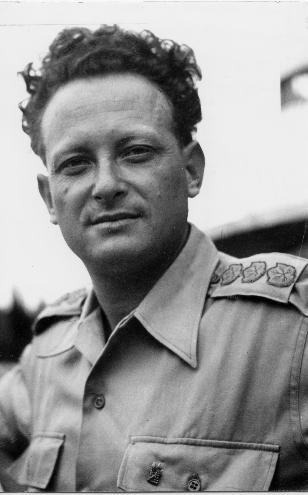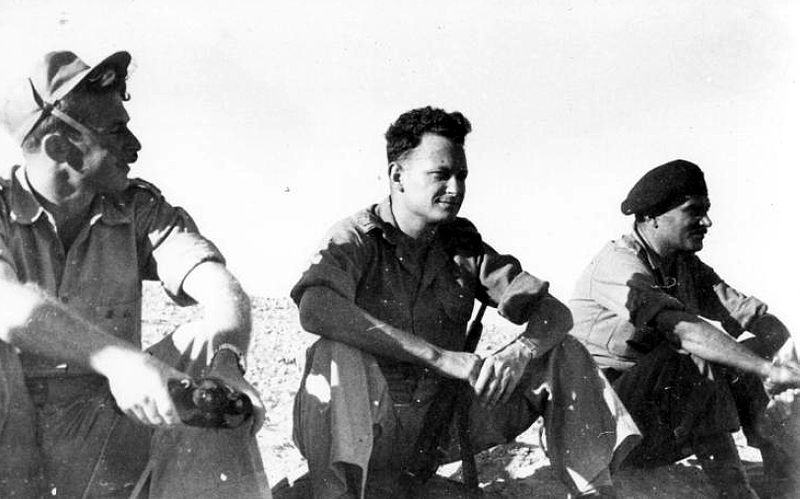<Back to Index>
- Commander of the Palmach Yigal Allon, 1918
PAGE SPONSOR


Yigal Allon (Hebrew: יגאל אלון, 10 October 1918 – 29 February 1980) was an Israeli politician, a commander of the Palmach, and a general in the IDF. He served as one of the leaders of Ahdut HaAvoda party and the Israeli Labor party, and acting Prime Minister of Israel, and was a member of the Knesset and government minister from the 10th through the 17th Governments.
Allon was born in Kfar Tavor in the Ottoman Empire. In 1937 he graduated from Kadoorie Agricultural High School, and joined kibbutz Ginosar.
He died in Afula on 29 February 1980 and was buried on the shore of Lake Kinneret (the Sea of Galilee) in the cemetery of Kibbutz Ginosar.
Allon commanded a field unit of the Haganah and then a mobile patrol in northern Palestine during the Arab riots of 1936 – 39. During this period he participated in several operations of the Special Night Squads (SNS), under the command of Orde Charles Wingate and H.E.N. Bredin. In 1941 he became one of the founding members of the Palmach. That same year he took part in the British invasion of Lebanon and Syria. In 1943 he became the Deputy Commander of the organization, and served in this post until 1945, when he became Commander in Chief.
As a Palmach commander, Yigal Allon approved the 18 December 1947 operation against al Khisas, near the Lebanese border in which houses were blown up and a dozen civilians were killed.
On 11 June 1948, at the climax of Ben Gurion's confrontation with the Irgun over the distribution of weapons from the Altalena, Allon commanded the troops ordered to shell the vessel.
During the 1948 Arab - Israeli War, Allon led several of the major operations on all three fronts, including Yiftach in the Galilee, Danny in the Center, Yoav, and Horev in the Negev. His last major military roles as commander were in October and December 1948: Operation Yoav towards the Hebron Hills and Operation Horev along the Southern Egyptian Front.
As Operational Commander of the Southern Command he was responsible for security along the borders with Egypt and parts of Jordan. On 4 June 1949 he ordered that an eight kilometer wide zone along the border would be a military area in which "all strangers found in [them] will be shot without interrogation."
On 25 October 1949, while he was out of the country, he was replaced as OC Southern Command by Moshe Dayan. Most of his Staff Officers resigned in protest. He retired from active service in 1950.
After ending his military career, Allon embarked on a political career. He became a prominent leader in Ahdut HaAvoda, and was first elected to the Knesset in 1955, where he served until his death. He was a member of the Economic Affairs Committee, Constitution, Law and Justice Committee, Education and Culture Committee, Joint Committee on the Motion for the Agenda Regarding Sports in Israel, and the Foreign Affairs and Defense Committee.
Allon served as the Minister of Labor from 1961 – 67. In this role he worked to improve the state employment service, extend the road network, and fought to get legislation on labor relations passed. From 1967 – 69 he served as the Deputy Prime Minister and Minister of Immigrant Absorption. Allon served briefly as interim Prime Minister following the death of Levi Eshkol on 26 February 1969. He held office until 17 March 1969, when Golda Meir took over after being appointed leader of the Labor Party. He became the Deputy Prime Minister and Minister of Education and Culture in Meir's government, and served in that post until 1974. During the September 1970 crisis in Jordan he advocated supporting King Hussein in his conflict with the PLO. In 1974 he was a part of the delegation to the Separation of Forces Agreement. He became the Minister of Foreign Affairs in 1974, and held this post until 1977. At the time of his sudden death in 1980, he was a candidate for the leadership of the Alignment, challenging the incumbent party head Shimon Peres.
Allon was the architect of the Allon Plan, a proposal to end the Israeli occupation of the West Bank
with a negotiated partition of territories. A major road in the West
Bank, leading north - eastwards from Jerusalem, is named after him.
In 2005, he was voted the 65th greatest Israeli of all time, in a poll by the Israeli news website Ynet to determine whom the general public considered the 200 Greatest Israelis.